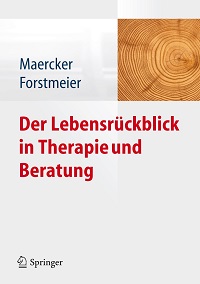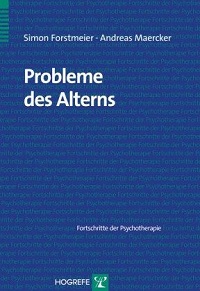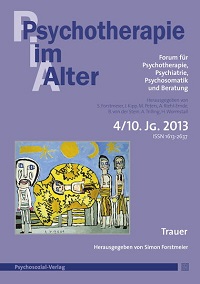Prof. Dr. Simon Forstmeier

Chair of Developmental Psychology and Clinical Psychology of the Lifespan
University of Siegen
Faculty II - Department of Psychology
Developmental Psychology and Clinical Psychology of the Lifespan
Adolf-Reichwein-Str. 2a
57076 Siegen, Germany
Office: AR-NB 113
Phone: +49 (0)271 740-4020
Fax: +49 (0)271 740-14020
Detailed CV
Functions at the University of Siegen
- Chair of Developmental Psychology and Clinical Psychology of the Lifespan
- Member of the Institute of Advanced Studies (FoKoS)
- Co-Speaker of the gerontology network Siegen (GeNeSi)
- Member of the Scientific Advisory Board of the Faculty of Life Sciences at the University of Siegen
- Member of the examination board "Bachelor Pedagogy: Development and Inclusion"
Central research interests
- Self-regulation and motivation over the lifespan (e.g. delay of gratification, motivational reserve in dementia)
- Self-regulation and motivation as a predictor of cognitive and affective health in old age
- Experimental reminiscence research
- Reminiscence interventions (structured life review, biographical work)
- Clinical gerontopsychology and geriatric psychotherapy (for dementia, PTSD, depression)
- Self-regulation training ("training of will", training of volitional skills)
- Interdisciplinary research on aging (in the context of the Gerontology Network Siegen, GeNeSi), i.a. Technological support for cognitive and affective processes
- 5/2001-3/2005 Klinischer Psychologe an der Psychosomatischen Rehabilitationsklinik St. Franziska-Stift, Bad Kreuznach
- 4/2001 Diplom in Psychologie, Technische Universität Darmstadt (“sehr gut”)
- 1997-1998 Graduate Visiting Student in Psychology, University of Warwick, UK
- 1994-2001 Studium der Psychologie, Technische Universität Darmstadt
Brief CV
- Since 9/2014 University professor (W3) for Developmental Psychology, University of Siegen (since 12/2018 «Developmental Psychology and Clinical Psychology of the Lifespan»)
- 1/2013 Habilitation (post-doctoral qualification), Venia Legendi for Psychology, University of Zurich, Switzerland
- 11/2005-8/2014 Senior teaching and research associate at the Department of Psychology, Psychopathology and Clinical Intervention, University of Zurich, Switzerland
- 4/2005-10/2005 Research scientist at the Department of Psychology, Clinical Psychology and Psychotherapy, University of Trier
- 5/2005 Approval as a psychological psychotherapist
- 12/2004 PhD in Psychology (Dr. rer. nat.), University of Trier ("summa cum laude")
- 4/2002-3/2005 Training as a psychological psychotherapist at the training institute of the St. Franziska Hospital, Bad Kreuznach
- 5/2001-3/2005 Clinical psychologist at the Psychosomatic Rehabilitation Clinic St. Franziska Hospital, Bad Kreuznach
- 4/2001 Diploma in Psychology, University of Technology Darmstadt (“very good”)
- 1997-1998 Graduate Visiting Student in Psychology, University of Warwick, UK
- 1994-2001 Studies of psychology, University of Technology Darmstadt
Honors and Awards
- 2012 Margret & Paul Baltes award for gerontological research, German Society for Gerontology and Geriatrics (DGGG)
- 2012 und 2014 Selected as one of the 10 best lecturers of the University of Zurich, Switzerland
- 2011 Poster award of the German Association for Psychiatry and Psychotherapy (DGPPN)
- 2008 Vontobel award for gerontological research, Family Vontobel Foundation, Zurich
- 2005 Award of „Friends of University of Trier“ for excellent dissertations
- 2001-2002 PhD scholarship for the dissertation from the Research Centre of Psychobiology and Psychosomatics (FPP) at the University of Trier, Germany
- 1997-1998 Scholarship as Graduate Visiting Student at University of Warwick, UK, from the German Academic Exchange Service (DAAD)
Board memberships
- Since 2019 Member of the Scientific Advisory Board of the Faculty of Life Sciences, University of Siegen
- Since 2018 Vice-Dean for Structure, Planning, and Finances of the Faculty II, University of Siegen
- Since 2016 Speaker of the Interest Group “Clinical geropsychology and psychotherapy in old age” of the division “Clinical Psychology and Psychotherapy” of the German Association of Psychology (DGPs)
- Since 2016 Co-founder of the Gerontology Network Siegen (GeNeSi)
- Since 2016 Member of the editorial board of the journal “GeroPsych: The Journal of Gerontopsychology and Geriatric Psychiatry”
- 2016-2018 Director of the Institute of Psychology, University of Siegen
- Since 2015 Member of the editorial board of the book series “Resilience studies”, Springer
- 2015-2018 Member of the board of faculty, University of Siegen
- Since 2012 Member of the editorial board of the journal “Psychotherapie im Alter” (Psychotherapy in old age)
- 2011-2014 Member of the program committee of the Certificate of Advanced Studies (CAS) Geropsychology, University of Zurich
- 2010-2012 Board member of the Swiss Society of Gerontology (Schweizerische Gesellschaft für Gerontologie, SGG)
- Since 2009 Member of the expert committee for the German S3 diagnostic and treatment guideline “Dementia”
- 2009-2012 President of the Swiss Professional Society for Geropsychology (Schweizerische Fachgesellschaft für Gerontopsychologie, SFGP)
- 2007-2013 Board member of the Swiss Professional Society for Geropsychology (Schweizerische Fachgesellschaft für Gerontopsychologie, SFGP)
- 2008-2014 Member of the Faculty of the International Max Planck Research School on the Life Course (LIFE)
- Since 2007 Member of the editorial advisory board of The Open Psychology Journal
Selected recent publications
The complete list of publications can be downloaded here.
Hesse, M., Forstmeier, S., Cuhls, H., & Radbruch, L. (2019). Volunteers in a biography project with palliative care patients – a feasibility study. BMC Palliative Care, 18:79. doi.org/10.1186/s12904-019-0463-0
Zimmermann, S. & Forstmeier, S. (2018). From fragments to identity: Reminiscence, life review and well-being of Holocaust survivors. An integrative review. Aging & Mental Health, Dec 6:1-25. doi: 10.1080/13607863.2018.1525608.
Thoma, M.V., Forstmeier, S., Schmid, R., Keller, O., Xepapadakos, F., Schreiter Gasser, U., Blessing, A., Ropohl, A., Bieri-Brünig, G., Debeer, D., & Maercker, A. (2018). Preliminary evidence for an increased likelihood of a stable trajectory in mild cognitive impairment in individuals with higher motivational abilities. BMC Geriatrics, 18(181). https://doi.org/10.1186/s12877-018-0865-5
Göllner, L., Ballhausen, N., Kliegel, M. & Forstmeier, S. (2018). Delay of gratification, delay discounting and their associations with age, episodic future thinking, and future time perspective. Frontiers in Psychology, Jan 25;8:2304. doi: 10.3389/fpsyg.2017.02304.
Bohlken, J., Weber, S. A., Forstmeier, S., Kohlmann, T. & Rapp, M. A. (2017). Reminiscence therapy for depression in dementia: An observational study with matched pairs. GeroPsych: The Journal of Gerontopsychology and Geriatric Psychiatry, 30, 145-151.
Pfeifer, L., Horn, A. B., Maercker, A. & Forstmeier, S. (2017). Caregiver perception of apathy in persons with mild cognitive impairment or Alzheimer's disease: a longitudinal study. Aging and Mental Health, 21, 494-500.
Fankhauser, S., Maercker, A. & Forstmeier, S. (2017). Social network and cognitive functioning in old age. Zeitschrift für Gerontologie und Geriatrie, 50, 123-131.
Thoma, V. M., Maercker, A. & Forstmeier, S. (2017). Evidence for different trajectories of delay discounting in older adults with mild cognitive impairment and mild Alzheimer’s disease. Journal of Gerontology: Psychological Sciences, 72, 956-965.
Hänggi, J., Lohrey, C., Drobetz, R, Baetschmann, H., Forstmeier, S., Maercker, A., Jäncke, L. (2016). Strength of structural and functional frontostriatal connectivity predicts self-control in the healthy elderly. Frontiers in Aging Neuroscience, 8, 307. doi: 10.3389/fnagi.2016.00307
Forstmeier, S. & Maercker, A. (2015). Motivational processes in mild cognitive impairment and Alzheimer's disease: results from the Motivational Reserve in Alzheimer's (MoReA) study. BMC Psychiatry, 15(1), 293.
Forstmeier, S., Maercker, A., Savaskan, E. & Roth, T. (2015). Cognitive behavioural treatment for mild Alzheimer's patients and their caregivers (CBTAC): study protocol for a randomized controlled trial. Trials, 16(1), 526.
Simmen-Janevska, K., Forstmeier, S., Krammer, S. & Maercker, A. (2015). Does Trauma impair self-control? Differences in delay discounting between former indentured child laborers and non-traumatized controls. Violence and Victims, 30, 1068-1081.
Fankhauser, S., Forstmeier, S., Maercker, A., Luppa, M., Luck, T. & Riedel-Heller, S. G. (2015). Risk of dementia in older adults with low versus high occupation-based motivational processes: Differential impact of frequency and proximity of social network. Journal of Geriatric Psychiatry and Neurology, 28, 126-135.
Drobetz, R., Hänggi, J., Maercker, A., Kaufmann, K., Jäncke, L. & Forstmeier, S. (2014). Structural brain differences between elderly individuals with high versus low delay of gratification. Behavioural Neuroscience, 128, 134-145.
Fankhauser, S., Drobetz, R., Mortby, M., Maercker, A. & Forstmeier, S. (2014). Depressive symptoms in later life: Differential impact of social support and motivational processes on depression in individuals with and without cognitive impairment. European Journal of Ageing, 11, 321-332.
Schwarzbach, M., Luppa, M., Forstmeier, S., König, H.-H. & Riedel-Heller, S. G. (2014). Social relations and depression in late life – A systematic review. International Journal of Geriatric Psychiatry, 29, 1-21.
Pfeifer, L., Drobetz, R., Fankhauser, S., Mortby, M., Maercker, A. & Forstmeier, S. (2013). Caregiver rating bias in Mild Cognitive Impairment and early-stage Alzheimer’s disease: Impact of caregiver burden and depression on rating discrepancy across domains. International Psychogeriatrics, 25, 1345-1355.
Preschl, B., Maercker, A., Wagner, B., Forstmeier, S., Baños, R., Alcañiz, M., Castilla, D., Botella, C. (2012). Life-review intervention with computer supplements for depression in the elderly: A randomized controlled trial. Aging and Mental Health, 16, 964-974.
Drobetz, R., Maercker, A., Spiess, C. K., Wagner, G. G. & Forstmeier, S. (2012). A household study of self-regulation in children: Intergenerational links and maternal antecedents in children’s self-regulation. Swiss Journal of Psychology, 71, 215-226.
Maercker, A., Forstmeier, S., Pielmaier, L., Spangenberg, L., Bähler, E. & Glaesmer, H. (2012). Adjustment disorders: Prevalence in a representative nationwide survey in Germany. Social Psychiatry and Psychiatric Epidemiology, 47, 1745-1752.
Pinquart, M. & Forstmeier, S. (2012). Effects of reminiscence interventions on psychological outcomes: A meta-analysis. Aging and Mental Health, 16, 541-558.
Forstmeier, S., Maercker, A., Maier, W., van den Bussche, H., Riedel-Heller, S., Kaduszkiewicz, H., Pentzek, M., Weyerer, S., Bickel, H., Tebarth, F., Luppa, M., Wollny, A., Wiese, B., & Wagner, M. (2012). Motivational Reserve: Motivation-related occupational abilities and risk of mild cognitive impairment and Alzheimer Disease. Psychology and Aging, 27, 353-363.
Drobetz, R., Maercker, A. & Forstmeier, S. (2012). Delay of gratification in old age: Assessment, age-related effects, and clinical implications. Aging Clinical and Experimental Research, 24, 6-14.
Mortby, M., Maercker, A. & Forstmeier, S. (2011). Midlife motivational abilities predict apathy and depression in Alzheimer’s disease: The Aging, Demographics and Memory Study. Journal of Geriatric Psychiatry and Neurology, 24, 151-160.
Preschl, B., Wagner, B., Forstmeier, S. & Maercker, A. (2011). E-Health interventions for depression, anxiety disorder, dementia, and other disorders in old age: A review. Journal of CyberTherapy and Rehabilitation, 4, 371-385.
Forstmeier, S., Drobetz, R. & Maercker, A. (2011). The Delay of Gratification Test for Adults (DoG-A): Validating a behavioral measure of self-motivation in a sample of older people. Motivation and Emotion, 35, 118-134.
Fankhauser, S., Wagner, B., Krammer, S., Aeschbach, M., Pepe, A., Maercker, A. & Forstmeier, S. (2010). The impact of social and interpersonal resources on adjustment disorder symptoms in older age: Motivational variables as mediators? Journal of Gerontopsychology and Geriatric Psychiatry, 23, 227-241.
Glaesmer, H., Gunzelmann, T., Brähler, E., Forstmeier, S. & Maercker, A. (2010). Traumatic experiences and post-traumatic stress disorder among elderly German: Results of a representative population-based survey. International Psychogeriatrics, 22, 661-670.
Forstmeier, S., Kuwert, P., Spitzer, C., Freyberger, H. J. & Maercker, A. (2009). Posttraumatic growth, social acknowledgment as survivors, and sense of coherence in former German child soldiers of World War II. American Journal of Geriatric Psychiatry, 17, 1030-1039.
Forstmeier, S. & Maercker, A. (2008). Motivational reserve: Lifetime motivational abilities influence cognitive and emotional health in old age. Psychology and Aging, 23, 886-899.
Maercker, A., Forstmeier, S., Enzler, A., Krüsi, G., Helfenstein, E., Hörler, E., Maier, C. & Ehlert, U. (2008). Adjustment disorders, PTSD, and depressive disorders in old age: Findings from a community survey. Comprehensive Psychiatry, 49, 113-120.
Forstmeier, S. & Maercker, A. (2007). Comparison of two diagnostic systems for Complicated Grief. Journal of Affective Disorders, 99, 203-211.
Forstmeier, S. & Rüddel, H. (2007). Improving volitional competence is crucial for the efficacy of psychosomatic therapy: A controlled clinical trial. Psychotherapy and Psychosomatics, 76, 89-96.
Monographs
Forstmeier, S. & Roth, T. (2017). Kognitive Verhaltenstherapie für Patienten mit leichter Alzheimer-Demenz und ihre Angehörigen (Cognitive Behavior Therapy for patients with mild Alzheimer’s disease). Berlin: Springer.
Maercker, A. & Forstmeier, S. (Eds.) (2012). Der Lebensrückblick in Therapie und Beratung (Life review in therapy and counseling). Berlin: Springer.
Forstmeier, S. & Maercker, A. (2008). Probleme des Alterns (Problems of aging). Göttingen: Hogrefe.
Forstmeier, S. (2005). Willenstraining. Förderung volitionaler Kompetenzen in Psychotherapie und psychosomatischer Rehabilitation (Training of will. Improving volitional competences in psychotherapy and psychosomatic rehabilitation). Stuttgart: WiKu-Verlag.
Forstmeier, S. & Rüddel, H. (2002). So werde ich willensstark! Manual der Gruppentherapie zur Förderung volitionaler Kompetenzen (Manual of the group therapy for enhancing volitional competences). Bad Kreuznach: Matthias Ess Verlag.




